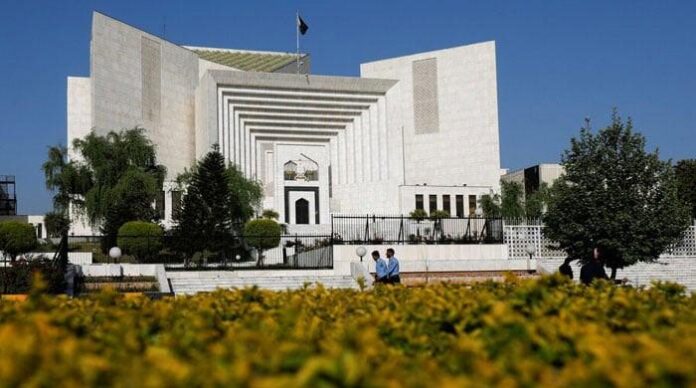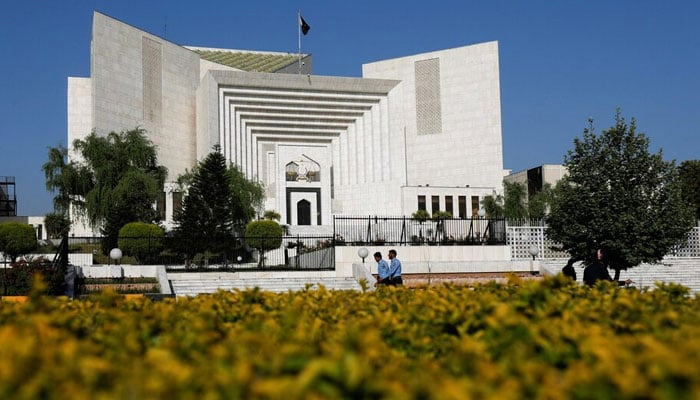The Judicial Commission of Pakistan (JCP) on Saturday approved the proposed draft of the Judicial Commission of Pakistan (Appointment of Judges) Rules 2024 with certain amendments during a session presided over by Chief Justice of Pakistan (CJP) Yahya Afridi.
Similarly, the top judicial body, by majority, also approved an extension in the period of the already nominated judges to the constitutional benches of the Supreme Court, for six months.
Last month, the JCP had formed a seven-member constitutional bench in a 7-5 split decision under Justice Amin-ud-Din Khan for a two-month term in line with the contentious 26th Amendment.
CJP Afridi chaired the two consecutive sessions of the top judicial body at the Supreme Court, Islamabad today, according to a statement issued by the top court.
The agenda of the meetings were the consideration of the proposed JCP (Appointment of Judges) Rules 2024 and the extension of the period of nomination of judges to the top court’s constitutional benches.
According to a declaration, the first meeting began at 11am and lasted for 8 hours. The session thoroughly reviewed the draft of the regulations for the judges’ appointment and also considered the public feedback received on the proposed rules.
After extensive deliberations, the top judicial body approved the proposed rules for the jurists’ appointments with certain amendments.
In the second meeting, the JCP, by majority, approved a six-month extension in the period of the already nominated judges to the constitutional benches of the apex court.
The first meeting was attended by SC’s Justice Syed Mansoor Ali Shah and Justice Munib Akhtar who joined the session via video link, Justice Amin-ud-Din Khan, Justice Jamal Khan Mandokhail, Islamabad High Court (IHC) Chief Justice Aamer Farooq, Balochistan High Court (BHC) Chief Justice Muhammad Hashim Khan Kakar, Peshawar High Court (PHC) Chief Justice Ishtiaq Ibrahim, Sindh High Court (SHC) Chief Justice Muhammad Shafi Siddiqui, Lahore High Court (LHC) Chief Justice Aalia Neelum, LHC Senior Puisne Judge Justice Shujaat Ali Khan, senior puisne judges of high courts, and the head of SHC constitutional bench.
The meeting was also attended by Federal Law Minister Azam Nazeer Tarar, Attorney General of Pakistan (AGP) Mansoor Usman Awan, government and opposition lawmakers from the National Assembly and the Senate, high-ups from provincial governments and bar councils, and others.
The second meeting was attended by SC jurists including Senior Puisne Judge Justice Shah, federal law minister, AGP, government and opposition lawmakers, and others.
In the previous meeting last month, the CJP had reconstituted of the top judicial body in line with the 26th Amendment besides forming a seven-member constitutional bench.
As per the 26th Constitutional Amendment, the strength of the Judicial Commission is 13 members. The judicial commission is mandated to appoint judges to the Supreme Court, high courts, and the Federal Shariat Court (FSC).
As per the addition of Article 175-A in the Constitution through the 26th Amendment, the JCP will be headed by CJP and will also consist of two senators and two MNAs.
The commission also consists of three senior-most judges of the Supreme Court, most senior judge of the constitutional bench, the Federal Minister for Law and Justice, the Attorney General for Pakistan, an advocate not having experience of less than 15 years of practice in the Supreme Court to be nominated by the Pakistan Bar Council (for two years).
A woman or non-Muslim member of parliament qualifies to be a parliamentarian to be nominated by the speaker for two years will also be part of the key panel.








